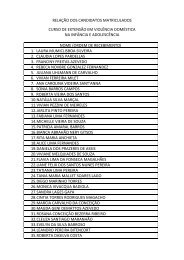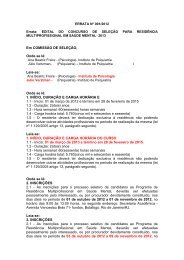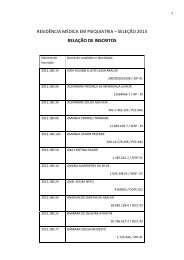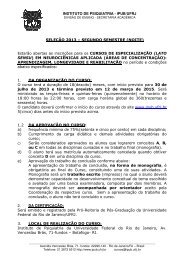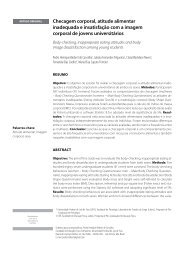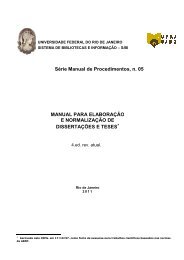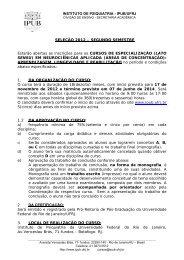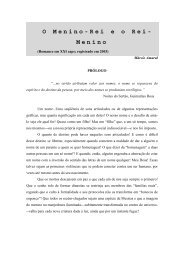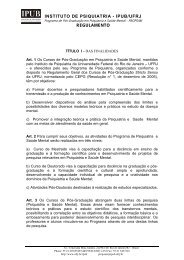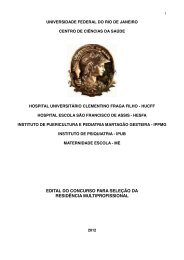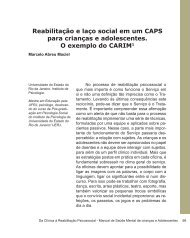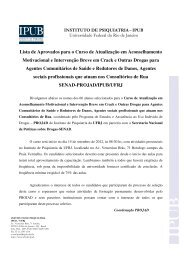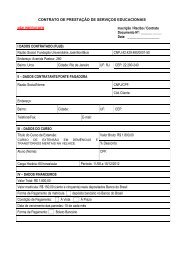Originais â Originals outubro | dezembro ⢠2011 - IPUB - UFRJ
Originais â Originals outubro | dezembro ⢠2011 - IPUB - UFRJ
Originais â Originals outubro | dezembro ⢠2011 - IPUB - UFRJ
You also want an ePaper? Increase the reach of your titles
YUMPU automatically turns print PDFs into web optimized ePapers that Google loves.
ORIGINAL ARTICLE<br />
Cardio-respiratory symptoms in panic disorder: a<br />
contribution from cognitive-behaviour therapy<br />
Sintomas cardiorrespiratórios no transtorno de pânico: uma<br />
contribuição da terapia cognitivo-comportamental<br />
Anna Lucia Spear King 1 , Adriana Cardoso de Oliveira e Silva 2 , Alexandre Martins Valencça 3 , Antonio Egidio Nardi 4<br />
ABSTRACT<br />
Keywords<br />
Panic, anxiety, phobia,<br />
exposures.<br />
Palavras-chave<br />
Pânico, ansiedade, fobia,<br />
exposições.<br />
Objective: To compare patients with panic disorder with agoraphobia treated with cognitive-<br />
-behavioural therapy (CBT) associated with the medication with patients treated only with medication<br />
and verify the behaviour of the cardio-respiratory symptoms of both groups. Methods:<br />
Randomized sample in the Psychiatry Institute of the Federal University of Rio de Janeiro, divided in<br />
two groups of 25 participants each. Group 1 undertook 10 weekly sessions of CBT with one hour of<br />
duration each together with medication. Group 2, Control, were administered medication that only<br />
consisted of tricyclic anti-depressants and selective inhibitors of the re-uptake of serotonin. Evaluation<br />
instruments were applied at the beginning and to the end of the interventions. Results: According<br />
to the applied scales, group 1 showed statistically more significant results than group 2, with:<br />
reduction of panic attacks, cardio-respiratory symptoms, anticipatory anxiety, agoraphobia avoidance<br />
and fear of bodily sensations. Conclusion: Exposures (in vivo and interoceptive), especially<br />
for induction symptom exercises and relaxation, were considered essential to prepare patients with<br />
panic disorder to handle future cardio-respiratory symptoms and panic attacks with agoraphobia.<br />
RESUMO<br />
Objetivo: Comparar pacientes com transtorno de pânico com agorafobia, tratados com<br />
terapia cognitivo-comportamental (TCC) e medicação, com pacientes com o mesmo diagnóstico,<br />
tratados apenas com medicação, e verificar o comportamento dos sintomas cardiorrespiratórios<br />
em ambos os grupos. Métodos: Amostra randomizada com 50 voluntários<br />
diagnosticados no Instituto de Psiquiatria da Universidade Federal do Rio de Janeiro, dividida<br />
em dois grupos de 25 pacientes: o grupo 1 realizou 10 sessões semanais e individuais de TCC<br />
com uma hora de duração combinada com medicação. O grupo 2, controle, foi tratado apenas<br />
com medicação. A medicação para ambos os grupos consistiu de antidepressivos tricíclicos<br />
e inibidores seletivos de recaptação da serotonina. Instrumentos de avaliação foram aplicados<br />
no início e ao final das intervenções. Resultados: De acordo com as escalas aplicadas,<br />
o grupo 1 apresentou resultados estatisticamente mais significativos do que o grupo 2, com<br />
redução dos ataques de pânico, dos sintomas cardiorrespiratórios, ansiedade antecipatória,<br />
esquiva agorafobia e medo das sensações corporais. Conclusão: As exposições (in vivo e interoceptivas)<br />
e os exercícios de indução dos sintomas e de relaxamento foram considerados<br />
essenciais para os pacientes aprenderem a lidar com o transtorno de pânico, com os ataques<br />
e com as possíveis situações agorafóbicas futuras.<br />
Recebido em<br />
10/2/<strong>2011</strong><br />
Aprovado em<br />
1/6/<strong>2011</strong><br />
1 Federal University of Rio de Janeiro (<strong>UFRJ</strong>), Psychiatry Institute (<strong>IPUB</strong>), Panic and Respiration Laboratory (LABPR), National Institute of<br />
Technological Science – Translational Medicine (INCT – Translational Medicine/CNPq), Rio de Janeiro, Brazil.<br />
2 Federal University Fluminense (UFF), Laboratory of Thanatology and Psychometrics, LABPR/<strong>IPUB</strong>/<strong>UFRJ</strong> – INCT-TM.<br />
3 UFF, Medical Sciences Centre, LABPR/<strong>IPUB</strong>/<strong>UFRJ</strong> – INCT-TM/CNPq.<br />
4 LABPR/<strong>IPUB</strong>/<strong>UFRJ</strong> – INCT-TM/CNPq.<br />
Address for correspondence: Anna Lucia Spear King<br />
Rua Almirante Gomes Pereira, 8 (casa), Urca – 22291-170 – Rio de Janeiro, RJ, Brasil<br />
Tel.: (55 21) 2295-4477/(55 21) 9219-1233<br />
E-mail: annaluciaking@gmail.com



